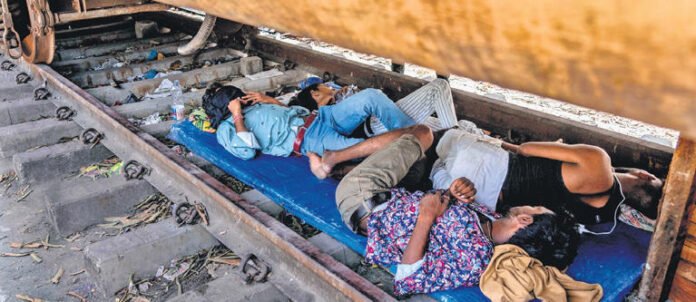As temperatures soar across India, Bihar and Uttar Pradesh are grappling with a deadly heatwave that has claimed the lives of 74 individuals, sending shockwaves through communities and prompting authorities to take urgent measures to mitigate the impact of the scorching heat. The tragic deaths serve as a grim reminder of the dangers posed by extreme weather conditions and the urgent need for climate adaptation strategies to protect vulnerable populations.
The heatwave, characterized by sweltering temperatures exceeding 40 degrees Celsius (104 degrees Fahrenheit), has left residents of Bihar and Uttar Pradesh reeling under oppressive heat and stifling humidity. The intense heat has taken a toll on the elderly, children, and outdoor workers, who are particularly vulnerable to heat-related illnesses such as heatstroke, dehydration, and heat exhaustion.
In Bihar, where the mercury soared to 45 degrees Celsius (113 degrees Fahrenheit) in some regions, the heatwave has claimed the lives of 52 individuals, according to official reports. The victims, primarily from rural areas, succumbed to heatstroke and related complications as they struggled to cope with the oppressive heat without access to adequate shelter or cooling facilities. In Uttar Pradesh, 22 heatstroke deaths have been reported, further underscoring the severity of the heatwave in the region.
The high number of heat-related fatalities in Bihar and Uttar Pradesh has sparked concerns about the preparedness of authorities to respond to extreme weather events and protect vulnerable populations. In recent years, both states have witnessed recurring heatwaves, exacerbating the challenges faced by communities already grappling with poverty, inadequate infrastructure, and limited access to healthcare services.
The impact of the heatwave extends beyond the loss of lives to encompass broader implications for public health, agriculture, and livelihoods. The scorching temperatures have led to crop failures, water shortages, and livestock deaths, threatening food security and exacerbating rural distress in agrarian economies heavily dependent on monsoon rains for irrigation and farming.
The unfolding crisis has prompted authorities to take urgent measures to address the immediate needs of affected communities and prevent further loss of lives. In Bihar, the state government has activated heatwave action plans, including setting up dedicated heatstroke treatment centers, distributing oral rehydration solution (ORS) packets, and conducting awareness campaigns to educate the public about heatwave safety measures.
Similarly, in Uttar Pradesh, authorities have launched heatwave preparedness and response efforts, deploying medical teams to vulnerable areas, distributing relief materials such as drinking water and umbrellas, and conducting door-to-door surveys to identify individuals at risk of heat-related illnesses.
While these measures are crucial for mitigating the immediate impact of the heatwave, experts emphasize the need for long-term strategies to build resilience and adapt to rising temperatures in the face of climate change. Investments in climate-resilient infrastructure, such as shaded public spaces, cool roofs, and urban green spaces, can help mitigate the urban heat island effect and provide refuge for vulnerable populations during heatwaves.
Additionally, efforts to enhance early warning systems, improve access to healthcare services, and strengthen social safety nets can help reduce the vulnerability of communities to heat-related hazards and ensure timely assistance for those in need.
The heatwave in Bihar and Uttar Pradesh serves as a stark reminder of the urgent need for collective action to address the growing threat of climate change and its impacts on human health and well-being. As extreme weather events become more frequent and intense, governments, communities, and civil society must work together to build resilience, protect vulnerable populations, and create sustainable, climate-resilient societies for future generations.
In addition, the heatwave-induced deaths in Bihar and Uttar Pradesh underscore the deadly consequences of rising temperatures and the urgent need for climate adaptation measures to protect vulnerable populations. While immediate relief efforts are essential for addressing the immediate impact of the heatwave, long-term strategies are necessary to build resilience and mitigate the risks posed by extreme weather events in a changing climate.

